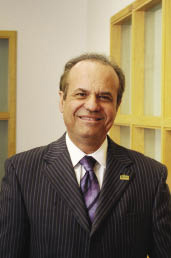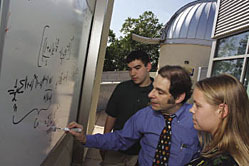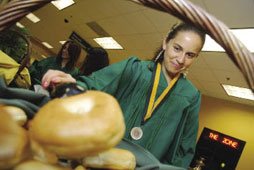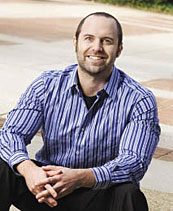News Briefs
- We're Naming Names
- Welcome New School of Management, Dean Jorge Haddock
- Honor Thy College
- Green and Gold Traditions
- Sports Round-Up
- Five Tips for Creating Happiness and Fulfillment
We're Naming Names
Last spring, College of Visual and Performing Arts (CVPA) Dean William Reeder announced that several departments within CVPA would become schools: the School of Music, the School of Art, and the School of Dance. The Theater Department and Film and Video Studies, Arts Management, and Computer Game Design programs would retain their current designations.
But with $500 million worth of construction projects in progress at Mason, those aren't the only name changes on campus. Check out the chart below for updates on new building and street names.
| Old Name | New Name | Location |
|---|---|---|
| Academic VI Research II | The Engineering Building | Fairfax Campus Near Research I |
| Arlington II | Founders Hall | Arlington Campus |
| Virginia Square | Virginia Square Plaza | Arlington Campus |
| Hotel and Conference Center | the Mason Inn Conference Center and Hotel | Fairfax Campus off Ox Road |
| Parking Deck iii | Rappahannock River Parking Deck | Northeastern Fairfax Campus |
| The Physical Education Building | The Recreation and Athletic Complex (RAC) | Fairfax Campus Near the Location of the Former Patriots Village |
| Robinson Field | RAC Field | Adjacent to the RAC |
| George Mason Boulevard and Aquia River Lane | Aquia Creek Lane | Northwestern Fairfax Campus |
| Spur Road | University Drive | North Entrance to Fairfax Campus |
Welcome New School of Management Dean Jorge Haddock

Jorge Haddock
Jorge Haddock was appointed dean of Mason’s School of Management, effective July 1, 2009. He comes to Mason from the University of Richmond, where he had been dean of the Robins School of Business since 2005.
“I am excited about the prospect of working with Dean Haddock and the experience and vigor he will bring to this position,” says Mason Provost Peter Stearns. “I think we are in for an exciting next phase in the School of Management.”
Haddock’s teaching interests include operations research, production planning, and information technology at the undergraduate and graduate levels. His primary research involves the design and implementation of effective information technology, production, and service systems, as well as their effect on corporate culture. He has written or cowritten more than 70 publications.
“The School of Management has placed itself in an enviable position for further short- and long-term success. There are tangible opportunities for enhancing the quality of all programs, while capitalizing on growth and revenue endeavors,” says Haddock. “I am honored and thrilled to be the next dean of the school and thankful to all who have helped the school reach this level of accomplishment.” Haddock succeeds Richard Klimoski, who had served as dean since 2002.
Haddock earned a BS from the University of Puerto Rico, an MS from Rensselaer Polytechnic Institute, and a PhD from Purdue University.
Honor Thy College
Beginning this academic year, Mason is rolling out a new program for its star students. The Honors College will transform the university’s Honors Program in General Education from one that had a heavy emphasis on the humanities and social sciences into one that comfortably encompasses students from every major across the university.

Astronomy professor Harold Geller, MAIS ’92,
DA ’05, with Honors students at the observatory.
Zofia Burr, an English professor and former director of the Honors Program, is the college’s dean, and Kathleen Alligood, a math professor, is the associate dean.
“The Honors College will provide a framework to highlight and coordinate the university’s programs for high-achieving students,” says Linda Schwartzstein, vice provost for academic affairs. “This initiative will enable the university to enhance existing programs and develop more opportunities for our students.
“We are fortunate that Zofia Burr and Kathleen Alligood have agreed to provide the leadership of this important project for the university.”
The new college will envelop three other existing programs:
- The University Scholars Program, a four-year, undergraduate merit-based scholarship program
- The Postgraduate Fellowships and Scholarships Program, which guides Mason undergraduates and recent graduates through the application process
- The Undergraduate Apprenticeship Program, which funds students working with faculty mentors on original research or a creative project
Although the new dean and associate dean don’t foresee the program growing in curricular offerings or enrollment (about 500 students are in the program), they envision additional programming to keep students involved in a “full and supported academic experience” once students have finished their general course requirements. They also anticipate opening the college to previously unrecognized students who demonstrate academic excellence in their first years, whether at Mason or as transfer students.
“I would like to see the program and the students be more visible and contribute more to the university,” Burr adds.
For more information on the
Honors College, visit the web site at honorscollege.gmu.edu.
Green and Gold Grad Traditions

Commencement is a time for reflection, kudos, and celebration. Mason is helping out with the last facet by hosting a variety of Grad Week events every May, such as Bagels and Bubbles, a breakfast with some bubbly for graduating students. Other popular events include a cruise on the Potomac and a Mason Day at Six Flags America.
Sports Round-Up
Baseball: After 40 wins in the regular season, Mason baseball landed in first place in the Colonial Athletic Association (CAA), its first title since 1992. The 2009 season marked the first time in school history that the baseball team was nationally ranked.

Mason baseball landed in first place in the Colonial
Athletic Association (CAA), its first title since 1992.
Despite two losses in the NCAA tournament, Mason baseball boasted a highly decorated team, with Mason senior outfielder Scott Krieger and junior catcher Chris Henderson named CAA Co-Players of the Year. Henderson was also named the CAA Defensive Player of the Year and head coach Bill Brown, BA Government and Political Science ’80, was named the CAA Coach of the Year.
Soccer: After capturing the CAA fall championship, the Mason men’s soccer team has its sights set on capturing the crown for the second consecutive season in 2009. The last time the Patriots strung together multiple conference championships was during the three-year span of 1984–86.
To capture its second consecutive conference championship and sixth in the history of the program, Mason will have to navigate a schedule that includes 18 regular-season matches, including seven nonconference opponents. The men’s regular season began September 19; women’s soccer began August 21
Swimming: Four Mason athletes traveled to Indianapolis this past summer to compete against the nation’s best swimmers in the 2009 ConocoPhillips USA Swimming National Championships.
Sophomores Ashley Danner and Preston Wolter, redshirt senior Eric Knight, and Mason graduate Tom Koucheravy, BS Health, Fitness, and Recreation Resources ’09, competed in the meet. Danner finished seventh in the 100-meter backstroke, and Koucheravy placed 14th in the 1,500-meter freestyle.
Wrestling: Last season, junior Cayle Byers and sophomore Mendbagana Tovuujav represented Mason at the 2009 NCAA Division I Wrestling Championships in St. Louis. After advancing to the quarterfinal round, Byers dropped a pair of close decisions on the second day of action. Tovuujav was named to the CAA All-Freshman Team at 174 pounds. He also was named the 2009 CAA Championships’ Most Outstanding Wrestler after capturing the 174-pound title.
For more updates on sports, go to gomason.cstv.com
Five Tips for Creating Happiness and Fulfillment
How can we feel positive and devote effort toward a meaningful life in these unstable, uncertain times? How do we find solace when our budget is shrinking and stressors at home and work are growing? Many of us are finding ourselves on life paths that we never expected as cortisol surges through our veins. Many of us are being forced to confront what it is we want our lives to be about.
Although we can’t always feel good, our ability to be profoundly aware and curious in the present moment is the most valuable currency at our disposal, says Todd B. Kashdan, professor of psychology at George Mason University and author of Curious? Discover the Missing Ingredient to a Fulfilling Life.

Todd B. Kashdan
We can’t forget that the building blocks for enduring happiness and meaning in life are moments when we are engaged and energized. Based on groundbreaking research, we can experience these moments regularly. Here are five strategies to build a firm, fulfilling foundation.
1. Nurture meaningful relationships.
Consider this fact: the only characteristic that researchers have found to distinguish very happy people from people of average happiness is that very happy people possess more satisfying, lasting relationships. When we feel liked, valued, and approved of by other people, we don’t just feel good, we actually become physically healthier. For instance, we are less susceptible to viruses and illnesses because our immune system is stronger.
But there are nonobvious secrets for creating meaningful, lasting relationships. Scientists have discovered that instead of relying on what we know about people and how they are similar to us, there is value in attending to what we don’t know about people and how they differ from us. As soon as we think we know everything there is to know about someone, we stop paying attention, which affects the quality of our relationships. The only things we know about other people is what they want to show us, what we look for, and what we want to see. Thus, start taking a renewed interest in the vast mysteries that other people provide. Look for what is unique in what they say and do from any other time you spent with them. Show interest and enthusiasm when they share positive news and events from their day. How we respond when our partners share good news is more important to their satisfaction in and commitment to our relationship with them than how supportive we are when things go wrong. Build relationships by sharing in other people’s passions and triumphs.
2. Cultivate mindfulness in daily life.
Build a regular practice of gently guiding your attention with an open and receptive attitude. Sure, you can go the route of meditation and yoga. After regular training, we can bring this open, curious mindset to our everyday life, including emotionally intense situations. But if meditation and yoga isn’t for you, skip right to the activities you are passionate about whether it be dancing, cooking, mowing the lawn, or hiking with your kids in the woods. All that matters is that you are fully aware of what is happening in the present without the blinders of expectations, stereotypes, and labels. This razor-thin moment between living in the past and thinking about the future is when we are most alive. When you build mindfulness skills, you become more tolerant and durable when confronting the inevitable pain, uncertainty, and challenges of being human.
3. Identify strengths and find situations to use them.
Feeling energized is the hallmark of using strengths, and when this happens, people are effortlessly themselves. Exploring which activities are energizing establishes the presence of strengths. By carefully dissecting our daily routine, we can identify strengths and weaknesses. It all begins with language. Start naming your strengths. Are you one of those people who is gifted at using only a few words to describe an idea when others take several paragraphs? I might call you a “streamliner.” Are you one of those MacGyver types who can solve complex mechanical problems with everyday objects (fixing a toilet with duct tape, dental floss, and a comb)? I might call you an “appliance incubator.” Be specific, be playful, and start spotting strengths.
Having a deep knowledge of strengths and weaknesses, and then being able to do something effective with them, is central to realizing your potential. This endeavor can be difficult because strengths may recede into the background or advance into the foreground, depending on the situation and need. Thus, strengths need to be understood in context. We can’t just ask someone whether they are humble; they need to be observed after an accomplishment or compliment.
Difficult times allow us to discover our resilience and strength. Certain people, activities, and careers are going to fit better with our unique combination of strengths and weaknesses. With careful consideration, we can start adjusting our goals so that we do things that energize us. By increasing opportunities to showcase our strengths, we increase our quality of life. Finding new life paths that are aligned with our strengths and passions is one of the unintentional benefits that arise from loss and difficulty.
4. Increase positivity and defuse stress and conflicts.
When we’re in an open, curious state of mind, at least some prejudice is reduced. For instance, although people generally are better at recognizing faces of their own race than faces of people of other races, putting people in a state of wonder reduces this discrepancy by improving memory for faces of people from other races. When we are arguing or negotiating with someone, collect information and ask questions about their perspective. What happens is that people who disagree with us view us as more warm and open, and in turn, show a willingness to be more generous and less demanding so that everyone ends up with better outcomes.
When your mood is positive, you are liable to be more flexible, creative, efficient, and a better decision maker. To take advantage of these benefits, explore and discover what triggers your own positive experiences. What types of music? What level of lighting? What about particular colors or clothing? How much socializing and with whom? What types of exercise and during what time of the day? Increase the presence of positivity and you will find it easier to navigate the social world in a tolerant, compassionate way.
5. Discover core values and make links to them.
If you aren't living according to your values, you won't be happy, no matter what you accomplish. Take the time to explore your deepest, most central values. That is, what are the guiding principles that will serve as a compass to help you make decisions among competing options and decide how to wisely spend your limited time and energy?
Imagine I could wave a magic wand to ensure that you would have the approval and admiration of everyone on the planet, forever. What, in that case, would you choose to do with your life? After you uncover the abstract values that define you, create concrete goals aligned with those values and then start devoting effort each day to progress toward these meaningful goals. In the creation of this rich, meaningful life, you are liable to catch happiness along the way.
Todd B. Kashdan is a clinical psychologist and professor of psychology at George Mason University. He is the author of Curious? Discover the Missing Ingredient to a Fulfilling Life. Details about his book and research can be found at www.toddkashdan.com. Follow Todd Kashdan on Twitter: @toddkashdan.